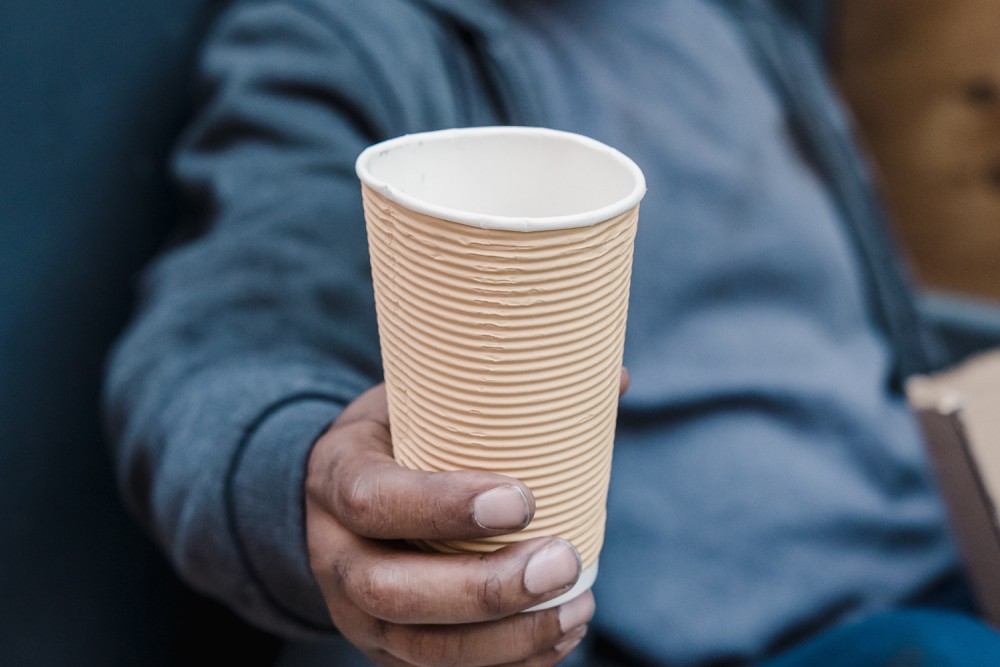Give to the one who asks of you
I’m on this man’s side, even though I didn’t give him any money. Right?

(Photo by Timur Weber / Pexels)
After an evening with friends at a bar, as we say our goodbyes on the sidewalk a man approaches us. “I’m sorry to bother you, but I just need a few dollars to help pay for a place to stay tonight.” We listen patiently as he explains his situation. I slip my hand into my pocket and fiddle with my wallet. I don’t think I have any cash, I never do these days, but I’m hoping for something small to give—a single would be great. If I had to, I could spare a five. After all, that was the cost of my beer, money that would have been better spent on a human being in need.
After his plea, he waits while we search for money but come up with just credit and debit cards. He is gracious. “Nobody’s got cash anymore,” he shrugs. There is a restaurant across the street that takes credit cards, so I ask if we could buy him dinner. “Thanks, but food’s not going to get me a place to stay,” he says, gently reminding me of his request, his specific need, and I realize that I’m looking for absolution, for him to let me off the hook. He knows what I know: that there is an ATM around the corner and another back inside the bar. None of us offers to use the debit cards in our hands to make a withdrawal, to give him a $20, the lowest possible denomination. “All right,” he glances around our circle, “have a good night.”
As we walk away, I run through self-justifying arguments in my head, trying to convince myself that I’ve done what I can, despite my refusal, because I voted for the $95 million affordable housing bond a few years ago. I’ve added my voice to deliberations about providing shelters to keep up with the growing need. The market’s invisible hand never prioritizes affordable housing. Between 2018 and 2022, the average rent for an apartment in our bustling region jumped from $1,034 to $1,370 and the median price of a house jumped from $250,000 to $415,000.
If only the man I met outside the bar knew my heart, that I really do care, that my politics are aligned with social democratic principles, that I’ve read Marx. Sure, I’m among the propertied class, but we bought our house for $151,000, back when affordable houses were available to those willing to tolerate some crime and the sound of gunshots. I’m a man of the people, I swear, committed to justice, equity, and solidarity, despite my middle-class lifestyle, elite education, and retirement investments. I’m on that man’s side.
But as soon as I denied his request, I remembered the first page of Kelly Johnson’s The Fear of Beggars, a dedication which is also a poem:
In memory of my father,
who asked me whether to invite a beggar home
with us
and waited for my answer.
To wait. To consider a stranger’s needs. To subject yourself to the vulnerability of another. To submit political commitments to everyday life decisions. For a personal encounter to be the undoing of our self-understanding as ethical, as faithful, as people who say we love our neighbors. This is the ordinary crucible of our sanctification. For someone to confront us with our sin, to feel the grip that money has on our lives, to know ourselves as possessed by our possessions. And to walk away.
Johnson quotes John Chrysostom: “The beginning and root of wealth must lie in injustice of some sort.” To store up wealth on Earth is to indebt ourselves to sin, to the economic infrastructure of greed. To hoard resources is to repress our dependence on a social life with our neighbors. She cites Basil of Caesarea: “The bread that you keep belongs to the one who is hungry . . . to the poor, the money that you keep hidden. Thus you commit as many injustices as there are persons to whom you could give.”
Johnson goes on to reflect on the economic relations and moral conventions that allow us to justify our estrangement from each other’s well-being. “Strangerliness is a habit that has been learned slowly,” she writes. “We will unlearn it with difficulty, and we will not do so without making changes, in our finances, our locations, our ways of doing business, and our encounters with strangers.”
The patterns of life and thought that come along with our use of money have instilled in us bad habits. We like a degree of social alienation, a buffer from knowing others and being known. Our lives depend on cruelties beyond comprehension, and we prefer our willful ignorance, our plausible deniability. We value our distance because we can handle only so much of the suffering of others. I’d rather have a statistic about poverty to use in my tirades against capitalism than a relationship with a person whose needs would add to the worries and responsibilities that keep me up at night. I don’t want to be overwhelmed with care for my neighbors.
“Give to the one who asks of you, and do not refuse anyone who wants to borrow from you,” Jesus tells us (Matt. 5:42). This is not a strategy for systemic change. It is practical guidance on how to habituate ourselves out of the love of money and into the love of neighbor—a habit to save us from the spiritual bondage of wealth. Salvation is a way of life in which we prepare ourselves, now, to belong to the advent of God’s world to come. Giving to anyone who asks is how we acclimate ourselves to God’s reign, where everyone has enough because no one has too much.






